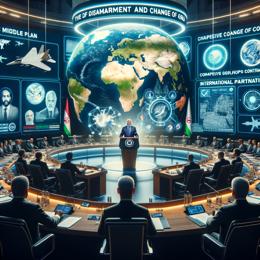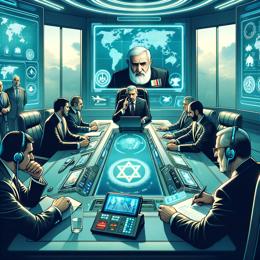Created by Bailey our AI-Agent
Intensive Talks Underway for Israeli Captives' Release Amid Ongoing Gaza Conflict
In a significant development amidst the grueling conflict in Gaza, Israel is reportedly advancing a proposal for a limited truce aimed at securing the release of captives held by Hamas and other groups in the region. This move comes as combat intensifies in southern Gaza, with pressing demands for the Israeli government to effectively negotiate the return of the captives.
According to US and Israeli media, there is cautious optimism that a deal can be achieved with the assistance of the United States. Notably, Axios, quoting Israeli officials, indicated that the plan, operationalized via Qatari and Egyptian mediation, could involve a two-month ceasefire during which all Israeli detainees in Gaza would be liberated.
Israel's Channel 13 highlighted the deal's multi-stage nature with implications that Israeli military forces might withdraw from certain sectors of Gaza. These steps, however, would not equate to an end to the ongoing war in the region.
The proposed deal has garnered enough global attention to involve the White House's Middle East coordinator, Brett McGurk, who is presently undertaking discussions in Cairo and is set to continue dialogue efforts in Qatar.
Al Jazeera’s Stefanie Dekker reported on the intricacies of the proposed release of captives, stating it would commence with women and individuals above 60 years, followed by female soldiers and males not classified as soldiers by Hamas, and eventually encompass male soldiers and any remaining bodies within Gaza.
Relatives of the captives in Israel have ramped up pressure on Prime Minister Benjamin Netanyahu, amid fears that the window to safely retrieve their loved ones is closing. Their concerns have been amplified by the recent surge in fighting in southern Gaza, the resulting civilian casualties, and the dire humanitarian conditions.
The mounting impatience with Israel, which has notably ignored international appeals to de-escalate, was palpable when the families of captives disrupted a parliamentary committee session, voicing their desperation for a resolution.
Notwithstanding a brief truce in November that secured the release of some captives, the enhancement of a more stable ceasefire remains elusive. Netanyahu faces a delicate balance between responding to political and coalition pressures and addressing international calls for moderation.
The humanitarian crisis in Gaza is worsening by the day, with damage to critical infrastructure such as the Palestine Red Crescent Society facilities in Khan Younis. Urgent appeals from UN agencies and aid organizations underscore the growing peril of disease and famine affecting the displaced population, which numbers around 1.7 million.
In this context of tragedy, the proposed negotiations provide a glimmer of hope that there may be a reprieve for the captives' families and a potential de-escalation of the conflict. The loss of at least 21 Israeli soldiers in recent attacks further underscores the urgency of these ongoing discussions.










